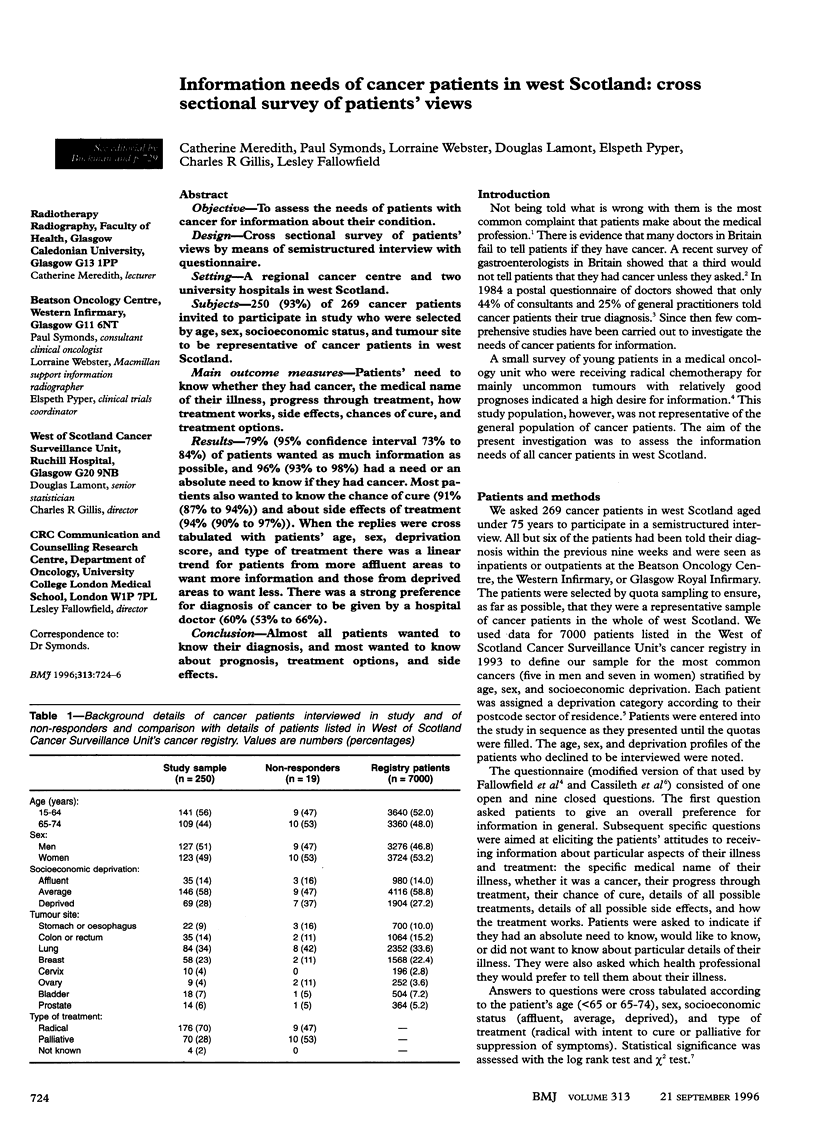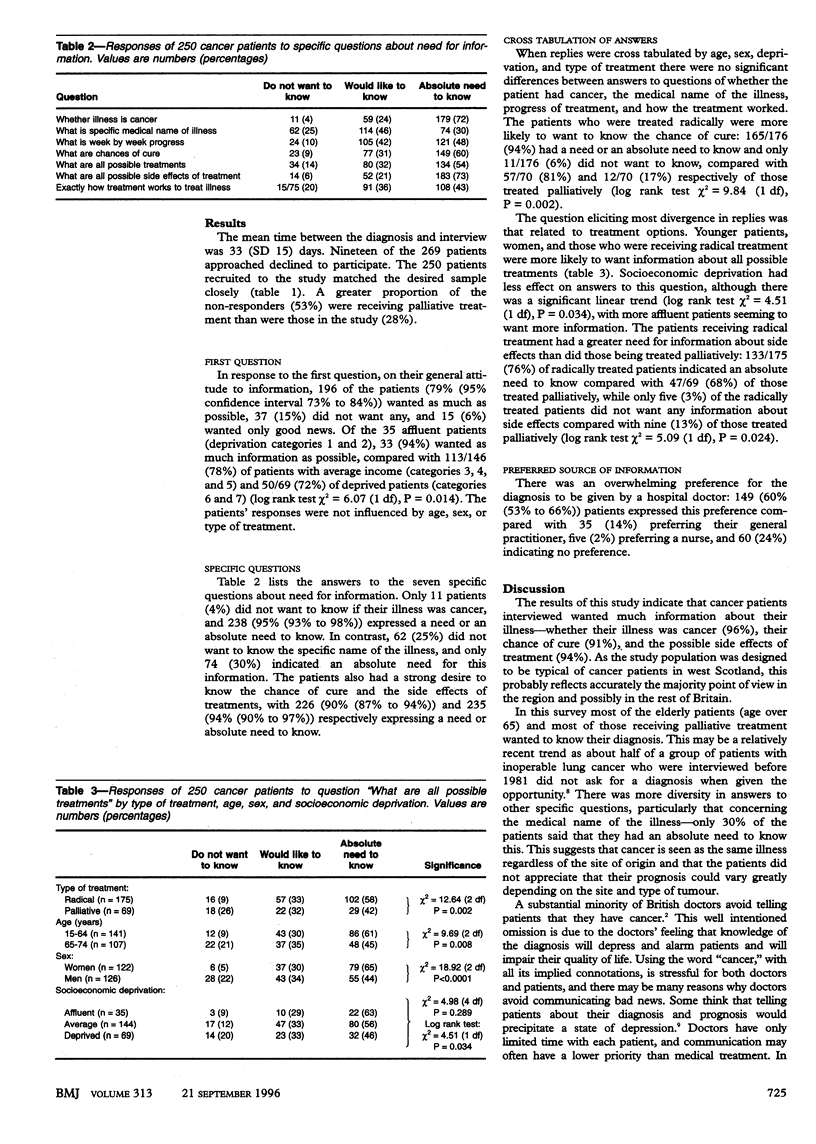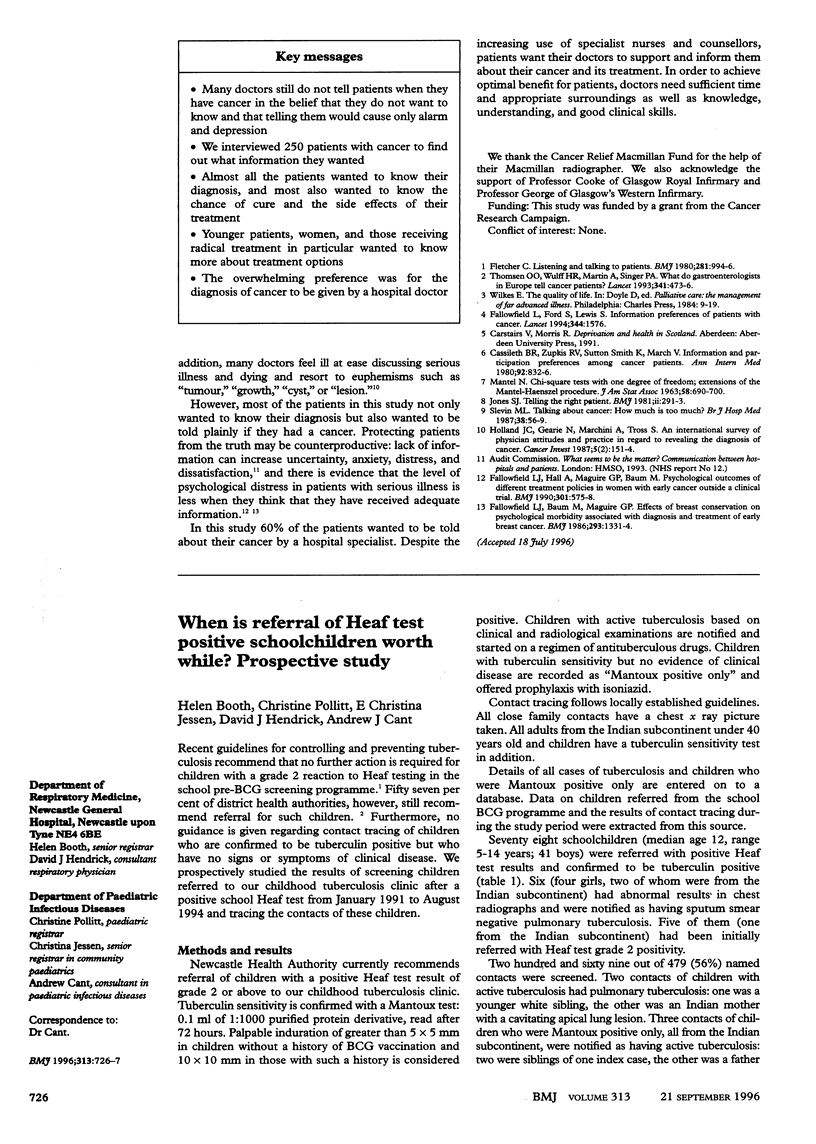Abstract
OBJECTIVE: To assess the needs of patients with cancer for information about their condition. DESIGN: Cross sectional survey of patients' views by means of semistructured interview with questionnaire. SETTING: A regional cancer centre and two university hospitals in west Scotland. SUBJECTS: 250 (93%) of 269 cancer patients invited to participate in study who were selected by age, sex, socioeconomic status, and tumour site to be representative of cancer patients in west Scotland. MAIN OUTCOME MEASURES: Patients' need to know whether they had cancer, the medical name of their illness, progress through treatment, how treatment works, side effects, chances of cure, and treatment options. RESULTS: 79% (95% confidence interval 73% to 84%) of patients wanted as much information as possible, and 96% (93% to 98%) had a need or an absolute need to know if they had cancer. Most patients also wanted to know the chance of cure (91% (87% to 94%)) and about side effects of treatment (94% (90% to 97%)). When the replies were cross tabulated with patients' age, sex, deprivation score, and type of treatment there was a linear trend for patients from more affluent areas to want more information and those from deprived areas to want less. There was a strong preference for diagnosis of cancer to be given by a hospital doctor (60% (53% to 66%). CONCLUSION: Almost all patients wanted to know their diagnosis, and most wanted to know about prognosis, treatment options, and side effects.
Full text
PDF


Selected References
These references are in PubMed. This may not be the complete list of references from this article.
- Cassileth B. R., Zupkis R. V., Sutton-Smith K., March V. Information and participation preferences among cancer patients. Ann Intern Med. 1980 Jun;92(6):832–836. doi: 10.7326/0003-4819-92-6-832. [DOI] [PubMed] [Google Scholar]
- Fallowfield L. J., Baum M., Maguire G. P. Effects of breast conservation on psychological morbidity associated with diagnosis and treatment of early breast cancer. Br Med J (Clin Res Ed) 1986 Nov 22;293(6558):1331–1334. doi: 10.1136/bmj.293.6558.1331. [DOI] [PMC free article] [PubMed] [Google Scholar]
- Fallowfield L. J., Hall A., Maguire G. P., Baum M. Psychological outcomes of different treatment policies in women with early breast cancer outside a clinical trial. BMJ. 1990 Sep 22;301(6752):575–580. doi: 10.1136/bmj.301.6752.575. [DOI] [PMC free article] [PubMed] [Google Scholar]
- Fallowfield L., Ford S., Lewis S. Information preferences of patients with cancer. Lancet. 1994 Dec 3;344(8936):1576–1576. doi: 10.1016/s0140-6736(94)90386-7. [DOI] [PubMed] [Google Scholar]
- Fletcher C. Listening and talking to patients. III: The exposition. Br Med J. 1980 Oct 11;281(6246):994–996. doi: 10.1136/bmj.281.6246.994. [DOI] [PMC free article] [PubMed] [Google Scholar]
- Holland J. C., Geary N., Marchini A., Tross S. An international survey of physician attitudes and practice in regard to revealing the diagnosis of cancer. Cancer Invest. 1987;5(2):151–154. doi: 10.3109/07357908709018468. [DOI] [PubMed] [Google Scholar]
- Jones J. Telling the right patient. Br Med J (Clin Res Ed) 1981 Jul 25;283(6286):291–292. doi: 10.1136/bmj.283.6286.291. [DOI] [PMC free article] [PubMed] [Google Scholar]
- Slevin M. L. Talking about cancer: how much is too much? Br J Hosp Med. 1987 Jul;38(1):56, 58-9. [PubMed] [Google Scholar]
- Thomsen O. O., Wulff H. R., Martin A., Singer P. A. What do gastroenterologists in Europe tell cancer patients? Lancet. 1993 Feb 20;341(8843):473–476. doi: 10.1016/0140-6736(93)90218-6. [DOI] [PubMed] [Google Scholar]


